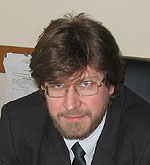© «Russia in Global Affairs». № 3, July
— September 2006
 Russia’s G8 presidency, which will be crowned by the July
Russia’s G8 presidency, which will be crowned by the July
summit in St. Petersburg, has become the leitmotif of Russia’s
foreign policy this year. The status of a global “helmsman,”
coupled with a most favorable situation on the energy market, has
instilled self-confidence in Russia. This feeling manifests itself
in different ways in various circumstances, often perplexing
Russia’s foreign partners and causing mixed reactions.
Is the
West’s criticism of Russia, which has intensified of late, really
fair? Economist Vlad Ivanenko believes there are many reasons to
criticize Russia yet, as he points out in this issue, the criticism
hits the wrong target. Russia’s partners should not focus on
general issues, for example, on how the democratic situation in the
country has changed under Putin, but on specific problems of
interaction. These may include the observance of corporate
governance standards and greater transparency of Russia’s largest
companies. These issues can influence the democratization process
in Russia more than all appeals to abstract notions. Other authors
in this issue, Hiski Haukkala and Peter Rutland, provide their
arguments on the same subject. Arkady Dvorkovich, the head of the
Expert Department in the Administration of the Russian President,
is optimistic about the future of the Russian economy. And he
believes that economic growth in the country will help improve
relations with foreign partners.
U.S.
scholar Leon Aron analyzes the motives that he believes guide the
architects of Russia’s foreign policy. He comes to the conclusion
that Moscow’s actions are well-grounded, although the Kremlin’s
logic is a far cry from what the West would like it to
be.
Vadim
Lukov, a diplomat and scientist, analyzes Russia’s level of
preparedness as it gets ready to fulfill its duties as the G8
president. Historian Fyodor Shelov-Kovedyaev is confident that
Russia is destined to play the role as the main engine of
pan-European development. He warns that Russia should not focus on
minor aspects, thereby missing a great opportunity to extend its
influence.
The
authors of our Metamorphoses section discuss Russia’s difficult
search for a new identity. Prominent Russian sociologists Alexander
Akhiezer, Igor Klyamkin and Igor Yakovenko analyze the place that
Russia occupies in the world from the point of view of the
historical path it has traveled over the centuries. Sergei
Markedonov weighs the chances of Russia finding the idea of a new
nation-state in the globalized world, while journalists Svetlana
Babayeva and Georgy Bovt warn about the danger of a purely
technocratic agenda, which Russia’s leadership is formulating today
as the basis for the country’s development. Social scientist Omar
G. Encarnacion, who studied
the democratic transformation of Spain after Franco, has found many
parallels between the development of his country and post-Soviet
Russia. He suggests that when a country makes the decision to
launch deep transformations it should place special emphasis on
achieving public consensus.
The search
for a self-identity is a task not limited only to Russia, but to
all of the countries that have emerged in the former Soviet Union.
The outstanding historian Roi Medvedev discusses the factors that
serve as the basis for this search. Ukrainian political scientist
Boris Zazhigayev writes about one aspect concerning the
establishment of newly independent states in the former Soviet
space: the position of ethnic Russians there who found themselves
in emigration overnight.
Two
articles in this issue are devoted to Russia’s Asia policy –
Russian Foreign Minister Sergei Lavrov contributed one, while the
other is an analytical report based on discussions at the Council
on Foreign and Defense Policy. Another author, Alec D. Epstein,
believes that Moscow is capable of exerting much influence on the
Middle East settlement process, which is now at a deadlock. He
argues that the participants in this process must face reality and
stop pretending that the Road Map peace plan can still be
reanimated. Political scientist Arif Yunus warns that the
escalation of tensions over Iran will aggravate the situation in
Azerbaijan, which is connected to its southern neighbor through a
long history of difficult relations.
Russia’s
G8 presidency will continue until the end of the year, so we will
return to this subject in subsequent issues to keep our readers up
to date on new developments.










